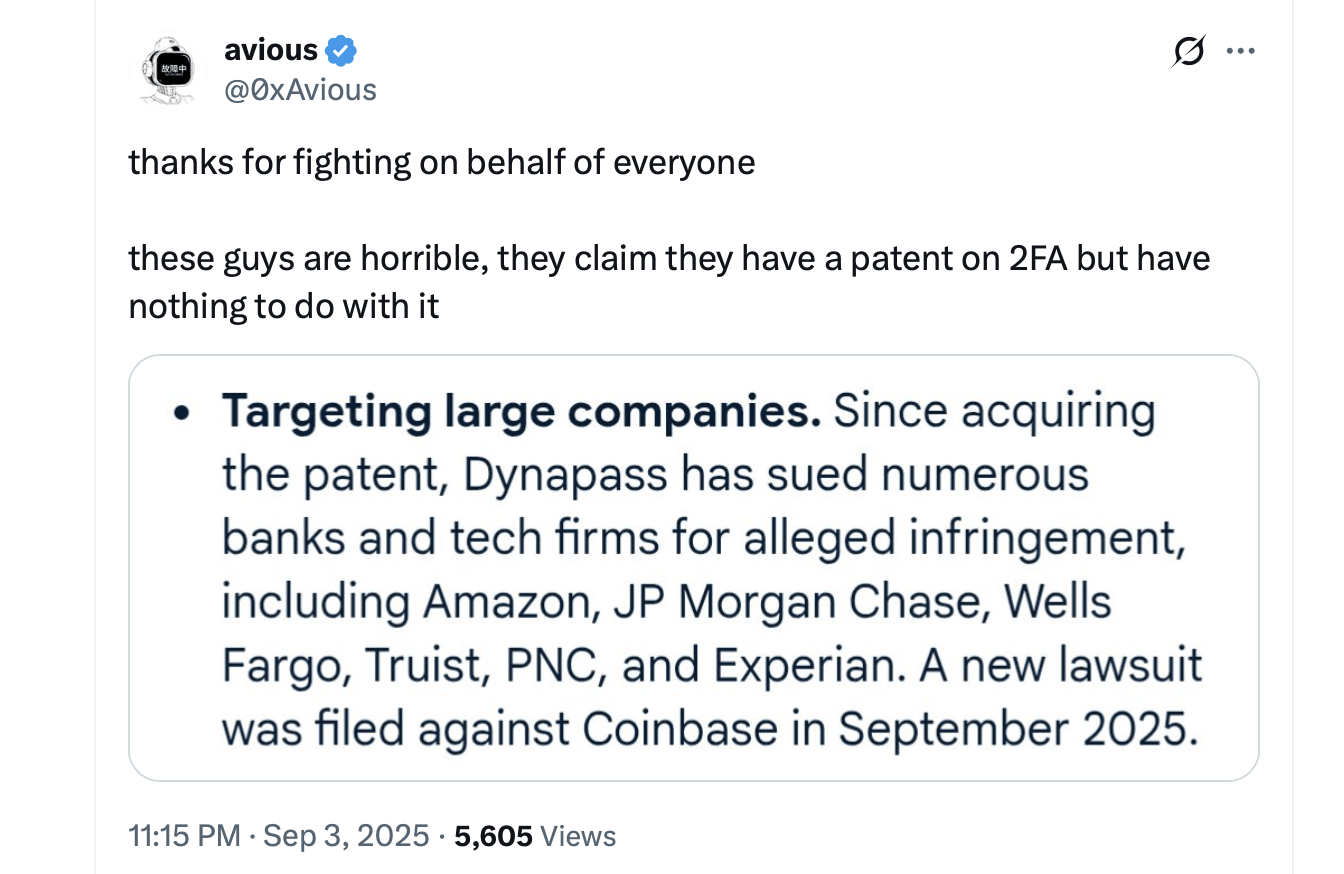Coinbase, that institution of restless modernity, has stepped forth into the arena-lawsuit in hand, brow unbowed-to challenge Dynapass Inc., accusing them of wielding expired patent claims as one might brandish a rusted sword at a steam locomotive.
Of Patents and Passions: The Strife Between Coinbase and Dynapass
The tale begins on a day so ordinary it might have slipped from the pages of history unnoticed, yet September 3, 2025, became a stage for ambition and the unyielding pursuit of justice (with a pinch of corporate vengeance). Coinbase filed its complaint in the U.S. District Court for the Central District of California, naming Dynapass Inc. and its noble squire, Dynapass IP Holdings. They pleaded for a declaration: that U.S. Patent No. 6,993,658-once illustrious, now with all the vitality of a forgotten vegetable in winter-was not infringed, and should henceforth be banished to the land of invalid claims.
It was July, hot as the Russian Steppe, when Dynapass sent forth an accusatory letter (one imagines, sealed with wax, trembling with anticipation). In it, Dynapass protested that Coinbase, with its suspiciously “secure” two-factor authentication, had laid siege to their patent as early as 2018, demanding reparations. Of course, Dynapass referenced prior conquests-companies that had yielded to the sword of litigation, apparently without reading Tolstoy or their calendar.
Coinbase’s rebuttal (delivered August 1) was icy and decisive: the patent, exhausted in March 2020, now belonged less to technology and more to archaeology. And the U.S. Patent and Trademark Office had, with all the solemn efficiency of bureaucracy, invalidated a principal claim in 2024. Coinbase further invoked the Supreme Court’s Alice test-a test that, in spirit, is designed to prevent one from patenting the shape of clouds or the concept of sadness. If a claim is abstract, let it remain as such; the world needs no more barriers to logging in.
Paul Grewal, Chief Legal Officer at Coinbase and unwitting protagonist of our saga, took to X, the modern town square proclaiming: “So that there’s no confusion about the [Coinbase] approach to patent extortion, allow me to confirm how we do things: we don’t pay out bogus claims, we sue you instead,”-one imagines him dropping the complaint on the table with a flourish, surrounded by emojis and perhaps a faint whiff of disdain. 💼🦸♂️
The lawsuit, for Coinbase, was more than sport-it was an ideological crusade against patent trolls (imagine the characters of Anna Karenina taking up arms against boredom, except here, against paperwork). The so-called patent trolls, creatures who subsist not on invention but upon the spoil of legal threats, were to be repelled, preferably with sarcasm and a well-assembled legal team.

The filing-troubled, noble, and only slightly tragic-underscored the ineffable tensions that haunt Silicon Valley, as patents over security protocols drift like bureaucratic ghosts across every conference room. Coinbase cautioned that should courts recognize expired or pretentious claims, all of industry might be condemned to authentication purgatory, forced forever to answer: “What was your mother’s maiden name?” 😬🔐
As of early September, the drama remains unresolved. The courtroom, that microcosm of society’s folly, waits-in vain or in hope-for the next act. The only certainty is that the case, much like a Tolstoyan dinner party, promises no quick ending and plenty of passive aggression.
Read More
- Epic Games Store Free Games for November 6 Are Great for the Busy Holiday Season
- EUR USD PREDICTION
- Battlefield 6 Open Beta Anti-Cheat Has Weird Issue on PC
- How to Unlock & Upgrade Hobbies in Heartopia
- Sony Shuts Down PlayStation Stars Loyalty Program
- The Mandalorian & Grogu Hits A Worrying Star Wars Snag Ahead Of Its Release
- ARC Raiders Player Loses 100k Worth of Items in the Worst Possible Way
- Unveiling the Eye Patch Pirate: Oda’s Big Reveal in One Piece’s Elbaf Arc!
- TRX PREDICTION. TRX cryptocurrency
- INR RUB PREDICTION
2025-09-04 21:35